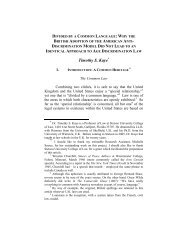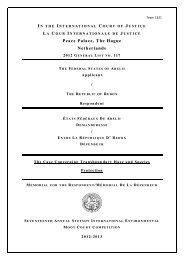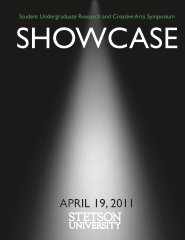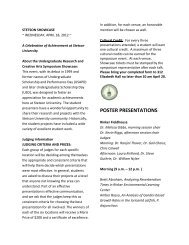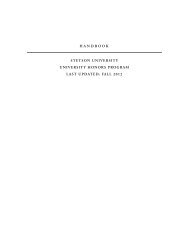Tiffany Huet Class of 2008 Justifying Violence: A ... - Stetson University
Tiffany Huet Class of 2008 Justifying Violence: A ... - Stetson University
Tiffany Huet Class of 2008 Justifying Violence: A ... - Stetson University
You also want an ePaper? Increase the reach of your titles
YUMPU automatically turns print PDFs into web optimized ePapers that Google loves.
These criticisms most likely evoked the response in 2002 <strong>of</strong> Osama bin Laden in his<br />
“Letter to America.” In this document, bin Laden lists his reasons for attacking the American<br />
economy, military, and citizenry. He goes on to defend his actions by restating that America’s<br />
citizens choose their government and benefit from its exploits abroad. He concludes by citing the<br />
lex talionis (law <strong>of</strong> justified retaliation), which provides his justification for avenging the death<br />
and suffering <strong>of</strong> the Muslim community with proportional death and suffering <strong>of</strong> Americans. 116<br />
This is, in fact, the same precedent touted by Bray in his justification. 117 This law <strong>of</strong> retribution<br />
takes the form <strong>of</strong> “an eye for an eye” in the biblical tradition while functioning to justify bin<br />
Laden’s claim to “the permission and the option to take revenge.” 118 While bin Laden’s ideology<br />
concerning aggression towards the United States in defense <strong>of</strong> the Islamic community is<br />
supported by many Muslims, his targeting <strong>of</strong> noncombatants is not only a subject <strong>of</strong> controversy<br />
in the Muslim community but also in complete contradiction to Islamic tradition and values.<br />
Conclusion<br />
Dietrich Bonhoeffer, Michael Bray, and Osama bin Laden have all taken up arms in<br />
seemingly different wars. However, they all strive to topple a system <strong>of</strong> oppression and injustice.<br />
Bonhoeffer, as we have seen, struggles to remain a pacifist during a time and a regime where<br />
violence seemed to be the most viable option. My thoughts at the start were that, while<br />
Bonhoeffer may have had good reason to kill Hitler, it was still unethical and not in accordance<br />
with the life <strong>of</strong> Jesus. However, studying the justifications <strong>of</strong> Bray and bin Laden has given me<br />
unforeseen insight into the theological and ethical circumstance <strong>of</strong> Bonhoeffer. All three men<br />
116<br />
Kelsay, “Islam and the Problem <strong>of</strong> <strong>Violence</strong>,” 54-55.<br />
117<br />
Bray, 51.<br />
118<br />
Kelsay, “Islam and the Problem <strong>of</strong> <strong>Violence</strong>,” 54.<br />
31



